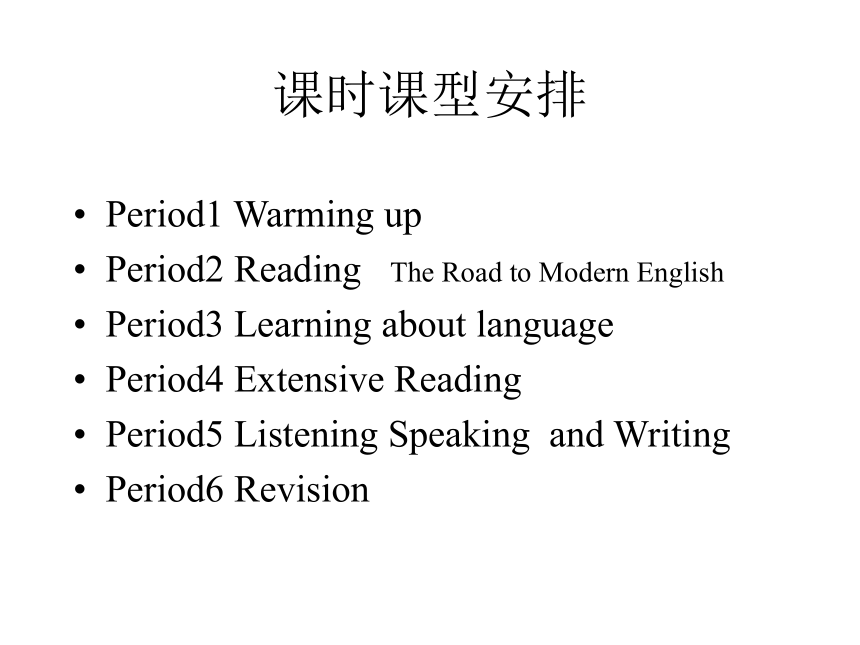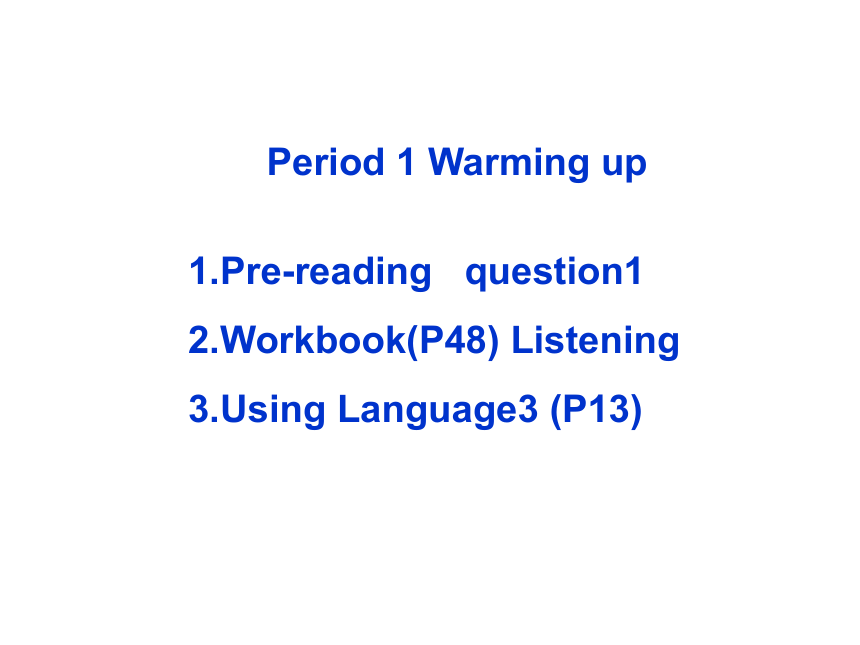高中英语人教版(新课程标准)必修1 Unit 2 English around the world1(50张PPT)
文档属性
| 名称 | 高中英语人教版(新课程标准)必修1 Unit 2 English around the world1(50张PPT) |

|
|
| 格式 | zip | ||
| 文件大小 | 890.3KB | ||
| 资源类型 | 教案 | ||
| 版本资源 | 人教版(新课程标准) | ||
| 科目 | 英语 | ||
| 更新时间 | 2018-01-01 00:00:00 | ||
图片预览












文档简介
课件50张PPT。 Unit 2
English around the world湖州二中高一英语备课组必修1单元重点内容和教学目标课时课型安排课时课型安排Period1 Warming up
Period2 Reading The Road to Modern English
Period3 Learning about language
Period4 Extensive Reading
Period5 Listening Speaking and Writing
Period6 Revision
Period 1 Warming upPre-reading question1
Workbook(P48) Listening
Using Language3 (P13) Warming up 任务:1. “世界英语”(World Englishes)的概念.
2.加强对英语世界性的认识。3.世界英语的差异, 课本以英国英语和美国英语为例加以说明.Great Britain AustraliaCanada IndiaIrelandNew ZealandSouth AfricaThe U.S.A.SingaporeEnglish Around the Worldthe USACanadaNew ZealandAustraliaSouth Africathe United KingdomIreland Is the English language in those countries always the same?British EnglishAmerican English&Do you know the differences between American English and British English?
British EnglishAmerican Englishspellingpronunciationvocabularycolour,color,favourite,favorite,theatre,theater,centre,center,travelled,traveled,metremeteraskdancewheelnotboxpost,mail,film,movie,shop,store,I think,I guess,kilometre Read the dialogues to find the British
and American words which are different
but have the same meaning. (P13) Think of more situations for your
conversations.Period2 Reading
The Road to Modern EnglishStep1 Lead in
Why do you think so many Chinese people want to learn English? Look at the title of the passage and
predict what it is mainly about.the development/history of English Skim the text to find out or make out a topic sentence for each paragraph.Step2 SkimmingParagraph 1: Today, more people speak English as their first ,second or foreign language than ever before.
Paragraph 2: Native English speakers can
understand each other even if they don’t speak the same kind of English.
Paragraph 3: All languages change and develop when cultures communicate with one another.
Paragraph4: Two big changes in English spelling happened in the 19th century.
Paragraph 5: English is also spoken as a foreign language or second language in South Asia and Africa.
Step3 Scanning
Make a timeline of the development
of English and find out why English
changed over time.developmentreasonsthe 5th century
AD based more
on Germanruled by
GermanAD800-1150more like French
ruled by Normanthe1600‘sa wide vocabularyShakespeareAmerican Englishto AmericaAustralian English to Australia1620the 18th centuryExtra informationNorman(诺曼人)
the expansion of British Empire
the establishment of colonies
the spread of English Step4 Discussion1.Can you show us some of the ways in which English has changed your life?
2.Why do you think more people in the
world now want to learn Chinese?(Predict the future of both English
and Chinese ) Step5 Language focus:
1.even if=even though: in spite of the fact; no matter whether: He likes to help us even if he is very busy.
2.communicate with: exchange information or conversation with other people: He learnt to use body language to communicate with deaf customers.
3.actually=in fact: used when you are adding new information to what you have just said: We’ve known for years. Actually, since we were babies.
4.be based on
5.make use of…Step6 Homework1.P11 dicovering useful words and
expressions
2.Workbook(P49) Using words and
expressions1-2Period3 Learning about language Discovering useful structures P12
Reading and speaking P15
Workbook:Using structures P50Retell the following sentences in
indirect speech
1. “You are really my best friend,”Tom said to me.
“I will come here again tomorrow,”said Jack.
3.He asked, “Is it raining now?”
4. “How many pages have you finished ?”she asked.Learning useful structures Say the following sentences to three students: S1: Open the window.
S2: Pass on the book to your deskmate.
S3: Will you please close the door?
What is the difference among the sentences I spoke to them just now?Help the students understand what is a command or a request.Open your books.Please open your books.Can you open your books please?Could / would you please open you books?commandrequest (polite)request (polite)request (polite)Request and command1. You want to close the door, but you cannot do it by yourself. How do you do it politely?
2. You are standing in the middle of a train carriage and you need to leave. How do you do politely?
3. A bear is about to approach a boy. What do you say to him to make sure that he won’t be hurt.
4. A boss wants the secretary to type a letter for him.What will he do?
5. Your father wants you to turn off the TV. What will he do? Give requests or commands according
to the following situations.
“Open the window,”the teacher said to the students .(command)The teacher told the students to open the
window. “Don’t open the window,” the teacher said to the
students.The teacher told the students not to open the
window.Change a command into
an Indirect Speech.told sb (not) to do sth“Open the window, please,” the teacher said to the
students.(requests)The teacher asked the students to open the
window.“Don’t open the window ,please,” the teacher said to
the students.The teacher asked the students not to open
the window.Change a request into
an Indirect Speech.ask(ed) sb (not) to do sth表示命令,用tell,order,command等。
表示请求,用ask,beg,request等。Can you discover the rules?Work in groups
Choose one of the situations and make
a dialogue. P15
Period4 Extensive Reading
Using Language: Reading
Standard English And Dialects P13
Listening P14?Warming up
How many dialects are there in China ?dialects family in China 北方方言吴语闽南语客家话湘语赣语粤语ChineseWarming upDo you think there are some dialects in English?English dialects in different countriesBritainThe U.S.ACanadaAustraliaIndiaNew ZealandRead the passage to answer the
following questions:
1.How many dialects of American
English have been listed in the text?
2. Why are there many dialects in
American English?
3. Will Chinese English develop its
own identity?Listening P14Homework: workbook P51
Reading Task
The Oxford English DictionaryPeriod5 Listening speaking and writingA brainstorm map P15
Workbook: Listening Task P51
Writing Task P53 A Brainstorming Map:
Why should I learn English well?Why should I learn
English well?To use for businessTo use in school To talk
to native
speakersTo read English
booksTo write to pen friendsTo listen to English music and moviesListen to find out what problems Wang Ting
and Chen Peng have and what they will
do to improve their English.Share your problems with your friends
and discuss how you can solve them.Write a short passage based on what you have talked about.Ways of improving listening/speaking/
reading/writingstructureYour problem suggestions on how to solve the problemconclusionPeriod6 Revision
Period2 Reading The Road to Modern English
Period3 Learning about language
Period4 Extensive Reading
Period5 Listening Speaking and Writing
Period6 Revision
Period 1 Warming upPre-reading question1
Workbook(P48) Listening
Using Language3 (P13) Warming up 任务:1. “世界英语”(World Englishes)的概念.
2.加强对英语世界性的认识。3.世界英语的差异, 课本以英国英语和美国英语为例加以说明.Great Britain AustraliaCanada IndiaIrelandNew ZealandSouth AfricaThe U.S.A.SingaporeEnglish Around the Worldthe USACanadaNew ZealandAustraliaSouth Africathe United KingdomIreland Is the English language in those countries always the same?British EnglishAmerican English&Do you know the differences between American English and British English?
British EnglishAmerican Englishspellingpronunciationvocabularycolour,color,favourite,favorite,theatre,theater,centre,center,travelled,traveled,metremeteraskdancewheelnotboxpost,mail,film,movie,shop,store,I think,I guess,kilometre Read the dialogues to find the British
and American words which are different
but have the same meaning. (P13) Think of more situations for your
conversations.Period2 Reading
The Road to Modern EnglishStep1 Lead in
Why do you think so many Chinese people want to learn English? Look at the title of the passage and
predict what it is mainly about.the development/history of English Skim the text to find out or make out a topic sentence for each paragraph.Step2 SkimmingParagraph 1: Today, more people speak English as their first ,second or foreign language than ever before.
Paragraph 2: Native English speakers can
understand each other even if they don’t speak the same kind of English.
Paragraph 3: All languages change and develop when cultures communicate with one another.
Paragraph4: Two big changes in English spelling happened in the 19th century.
Paragraph 5: English is also spoken as a foreign language or second language in South Asia and Africa.
Step3 Scanning
Make a timeline of the development
of English and find out why English
changed over time.developmentreasonsthe 5th century
AD based more
on Germanruled by
GermanAD800-1150more like French
ruled by Normanthe1600‘sa wide vocabularyShakespeareAmerican Englishto AmericaAustralian English to Australia1620the 18th centuryExtra informationNorman(诺曼人)
the expansion of British Empire
the establishment of colonies
the spread of English Step4 Discussion1.Can you show us some of the ways in which English has changed your life?
2.Why do you think more people in the
world now want to learn Chinese?(Predict the future of both English
and Chinese ) Step5 Language focus:
1.even if=even though: in spite of the fact; no matter whether: He likes to help us even if he is very busy.
2.communicate with: exchange information or conversation with other people: He learnt to use body language to communicate with deaf customers.
3.actually=in fact: used when you are adding new information to what you have just said: We’ve known for years. Actually, since we were babies.
4.be based on
5.make use of…Step6 Homework1.P11 dicovering useful words and
expressions
2.Workbook(P49) Using words and
expressions1-2Period3 Learning about language Discovering useful structures P12
Reading and speaking P15
Workbook:Using structures P50Retell the following sentences in
indirect speech
1. “You are really my best friend,”Tom said to me.
“I will come here again tomorrow,”said Jack.
3.He asked, “Is it raining now?”
4. “How many pages have you finished ?”she asked.Learning useful structures Say the following sentences to three students: S1: Open the window.
S2: Pass on the book to your deskmate.
S3: Will you please close the door?
What is the difference among the sentences I spoke to them just now?Help the students understand what is a command or a request.Open your books.Please open your books.Can you open your books please?Could / would you please open you books?commandrequest (polite)request (polite)request (polite)Request and command1. You want to close the door, but you cannot do it by yourself. How do you do it politely?
2. You are standing in the middle of a train carriage and you need to leave. How do you do politely?
3. A bear is about to approach a boy. What do you say to him to make sure that he won’t be hurt.
4. A boss wants the secretary to type a letter for him.What will he do?
5. Your father wants you to turn off the TV. What will he do? Give requests or commands according
to the following situations.
“Open the window,”the teacher said to the students .(command)The teacher told the students to open the
window. “Don’t open the window,” the teacher said to the
students.The teacher told the students not to open the
window.Change a command into
an Indirect Speech.told sb (not) to do sth“Open the window, please,” the teacher said to the
students.(requests)The teacher asked the students to open the
window.“Don’t open the window ,please,” the teacher said to
the students.The teacher asked the students not to open
the window.Change a request into
an Indirect Speech.ask(ed) sb (not) to do sth表示命令,用tell,order,command等。
表示请求,用ask,beg,request等。Can you discover the rules?Work in groups
Choose one of the situations and make
a dialogue. P15
Period4 Extensive Reading
Using Language: Reading
Standard English And Dialects P13
Listening P14?Warming up
How many dialects are there in China ?dialects family in China 北方方言吴语闽南语客家话湘语赣语粤语ChineseWarming upDo you think there are some dialects in English?English dialects in different countriesBritainThe U.S.ACanadaAustraliaIndiaNew ZealandRead the passage to answer the
following questions:
1.How many dialects of American
English have been listed in the text?
2. Why are there many dialects in
American English?
3. Will Chinese English develop its
own identity?Listening P14Homework: workbook P51
Reading Task
The Oxford English DictionaryPeriod5 Listening speaking and writingA brainstorm map P15
Workbook: Listening Task P51
Writing Task P53 A Brainstorming Map:
Why should I learn English well?Why should I learn
English well?To use for businessTo use in school To talk
to native
speakersTo read English
booksTo write to pen friendsTo listen to English music and moviesListen to find out what problems Wang Ting
and Chen Peng have and what they will
do to improve their English.Share your problems with your friends
and discuss how you can solve them.Write a short passage based on what you have talked about.Ways of improving listening/speaking/
reading/writingstructureYour problem suggestions on how to solve the problemconclusionPeriod6 Revision
